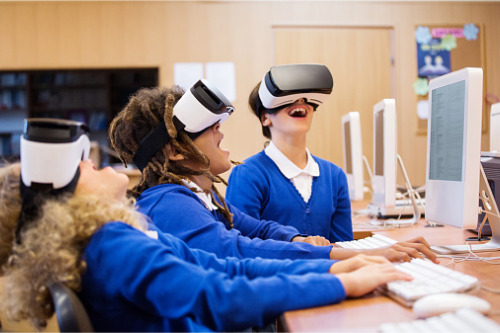
Virtual reality (VR) can be used to improve the design of classrooms and learning spaces, allowing students to learn without distractions, a new study has revealed.
A team of researchers from Bond University used VR headsets to test the acoustics of virtual classrooms to determine students’ cognitive performance in three settings – no ambient noise, typical classroom ambient noise, and ambient noise with acoustic treatments.
The study found that while ambient noise can negatively affect cognitive performance, reducing it with the use of acoustic treatments can help create a learning environment that is on a par with no-noise simulation.
Dr Libby Sander, assistant professor of organisational behaviour at the Bond Business School, said poor classroom acoustics can cause students to miss up to one in four spoken words.
“You can imagine the impact that has on their learning, their recall and on their education,” she said.
“Another study in Europe showed noise levels in classrooms were having significant negative effects on teachers’ health, almost at the threshold level of a heart attack. It’s an area that’s incredibly important for both teachers and students.”
Matthew Ottley, managing consultant at Marshall Day Acoustics and co-author the report, said the study was important because replicating the tests without the help of VR technology was costly and time-consuming.
“If you did this experiment in real life you might end up with a month between the first round of tests and the second, whereas we can do it instantly (with VR) and control all the variables,” he said.
Ottley added that the acoustics of classrooms were playing an increasingly crucial role in helping students learn because of the changes on how teaching was being conducted.
“The way classroom design is going, there are a lot more innovative learning environments – you might have 80 kids in a large single space with multiple groups doing different activities at once,” he said.
Ottley said acoustic treatments were often cut during the design stage because “people making the decisions” might not be aware of their importance.
“The more data we have to demonstrate the real benefit to students of providing acoustic treatments, the more likely it is that those treatments will get through to the end product,” he said.
Dr Oliver Baumann, assistant professor of psychology at Bond University, said the research was different from recent studies because it used objective performance parameters such as heart rate rather than relying on participants’ description of how they felt.
“Self-reports can be biased because students might not want to admit they are negatively affected by noise, or sometimes might not even be fully aware of it,” he said.
“On the other hand, changes in heart rate or response speed on a standardised cognitive performance test provide unbiased and reliable insights into the effects of classroom noise.”


